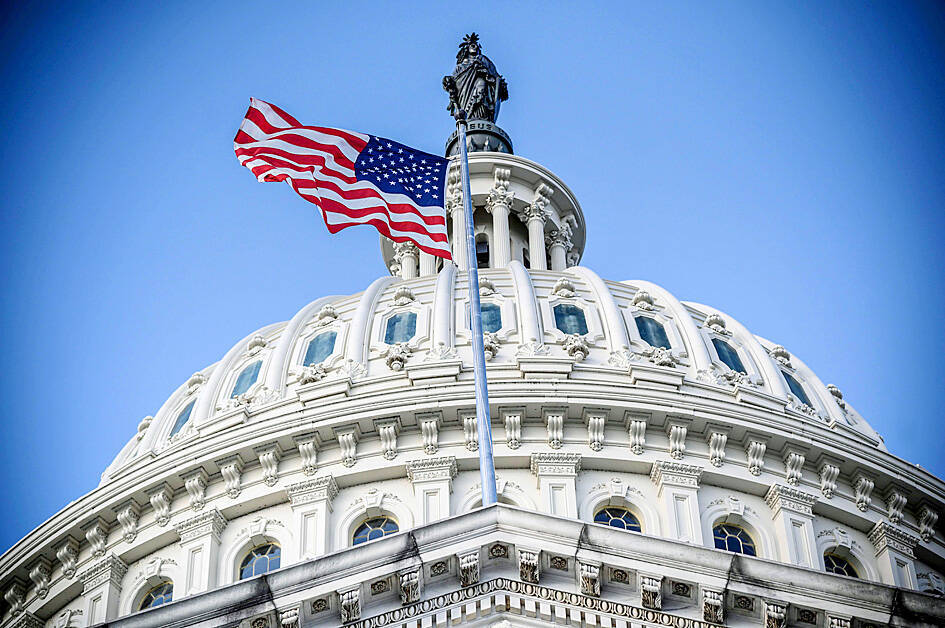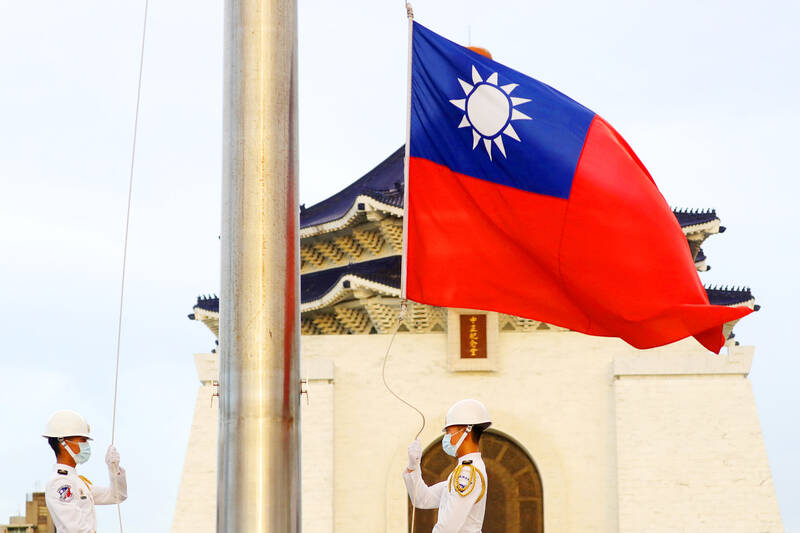US House of Representatives committees on Tuesday passed bills in support of Taiwan, including one that would require the US Department of State to make periodic reviews of ties with Taiwan to ensure that any changes in US policy toward Taiwan would help the relationship.
The House Financial Services Committee passed the Taiwan Conflict Deterrence Act, the PROTECT Taiwan Act and the Taiwan Non-Discrimination Act, while the House Foreign Affairs Committee passed the Taiwan Assurance Implementation Act, which makes the demand of the state department.
All of the bills were passed unanimously.

Photo: AFP
In a statement on Friday last week to introduce the Taiwan Assurance Implementation Act, US Representative Ann Wagner, vice chair of the Financial Services Committee, said that a decision by the administration of US President Joe Biden to reimpose restrictions on “self-imposed guidelines” governing interactions between Taiwanese and US officials “only emboldens China’s Communist Party and weakens US support for our ally Taiwan.”
“When [the US] Congress passed the Taiwan Assurance Act in 2020, we were crystal clear that the United States needed to eliminate these outdated and unnecessary restrictions on US-Taiwan engagement,” Wagner said.
The Taiwan Non-Discrimination Act would instruct the US governor of the IMF to advocate for Taiwan’s membership in the UN agency, and push the global lender to offer Taiwan technical assistance and training, and provide Taiwanese with equal employment opportunities.

Photo: Chiang Ying-ying, AP
US Representative Young Kim, the House Foreign Affairs Subcommittee on the Indo-Pacific chairwoman who sponsored the bill on non-discrimination, said: “Taiwan is one of the world’s most astonishing economic growth stories, so why wouldn’t we want its experiences to inform the work of the IMF?”
“We cannot let the People’s Republic of China [PRC] exploit countries in need and take advantage of international treaties and organizations,” said Kim, who also sponsored the People’s Republic of China is not a Developing Country Act, which was also passed.
US Representative Michael McCaul, chairman of the House Foreign Affairs Committee, said: “Make no mistake, China is not a developing country, despite the People’s Republic of China’s claims... I strongly urge the international community to terminate the PRC’s ‘developing country’ status and work with partners to do the same.”

Photo: AP
The Taiwan Conflict Deterrence Act would require the US president to publish the financial assets of top Chinese leaders, and cut them and their family members off from financial services if China were to harm US interests because of a threat it makes regarding Taiwan.
The PROTECT Taiwan Act would direct the White House to push for the exclusion of China from international organizations, including the G20 and the Bank of International Settlements in the event of “any threat to the security or the social or economic system” of the people of Taiwan.
The finance committee also passed a resolution to demand that Beijing release Mark Swidan, a US citizen and businessman who has been detained in China since 2012.

AIR SUPPORT: The Ministry of National Defense thanked the US for the delivery, adding that it was an indicator of the White House’s commitment to the Taiwan Relations Act Deputy Minister of National Defense Po Horng-huei (柏鴻輝) and Representative to the US Alexander Yui on Friday attended a delivery ceremony for the first of Taiwan’s long-awaited 66 F-16C/D Block 70 jets at a Lockheed Martin Corp factory in Greenville, South Carolina. “We are so proud to be the global home of the F-16 and to support Taiwan’s air defense capabilities,” US Representative William Timmons wrote on X, alongside a photograph of Taiwanese and US officials at the event. The F-16C/D Block 70 jets Taiwan ordered have the same capabilities as aircraft that had been upgraded to F-16Vs. The batch of Lockheed Martin

GRIDLOCK: The National Fire Agency’s Special Search and Rescue team is on standby to travel to the countries to help out with the rescue effort A powerful earthquake rocked Myanmar and neighboring Thailand yesterday, killing at least three people in Bangkok and burying dozens when a high-rise building under construction collapsed. Footage shared on social media from Myanmar’s second-largest city showed widespread destruction, raising fears that many were trapped under the rubble or killed. The magnitude 7.7 earthquake, with an epicenter near Mandalay in Myanmar, struck at midday and was followed by a strong magnitude 6.4 aftershock. The extent of death, injury and destruction — especially in Myanmar, which is embroiled in a civil war and where information is tightly controlled at the best of times —

Taiwan was ranked the fourth-safest country in the world with a score of 82.9, trailing only Andorra, the United Arab Emirates and Qatar in Numbeo’s Safety Index by Country report. Taiwan’s score improved by 0.1 points compared with last year’s mid-year report, which had Taiwan fourth with a score of 82.8. However, both scores were lower than in last year’s first review, when Taiwan scored 83.3, and are a long way from when Taiwan was named the second-safest country in the world in 2021, scoring 84.8. Taiwan ranked higher than Singapore in ninth with a score of 77.4 and Japan in 10th with

SECURITY RISK: If there is a conflict between China and Taiwan, ‘there would likely be significant consequences to global economic and security interests,’ it said China remains the top military and cyber threat to the US and continues to make progress on capabilities to seize Taiwan, a report by US intelligence agencies said on Tuesday. The report provides an overview of the “collective insights” of top US intelligence agencies about the security threats to the US posed by foreign nations and criminal organizations. In its Annual Threat Assessment, the agencies divided threats facing the US into two broad categories, “nonstate transnational criminals and terrorists” and “major state actors,” with China, Russia, Iran and North Korea named. Of those countries, “China presents the most comprehensive and robust military threat